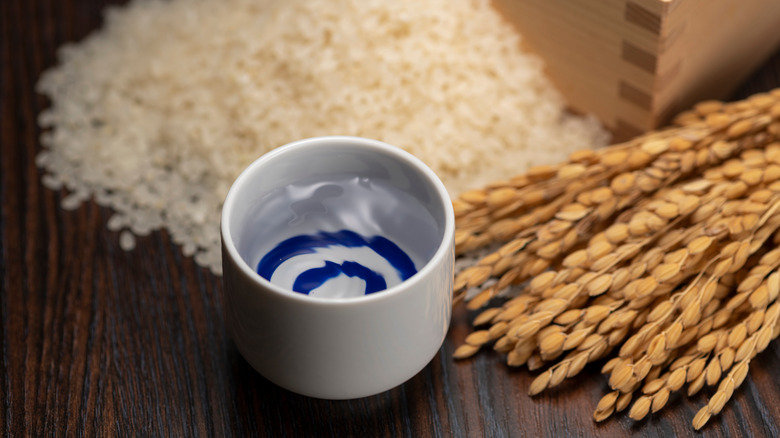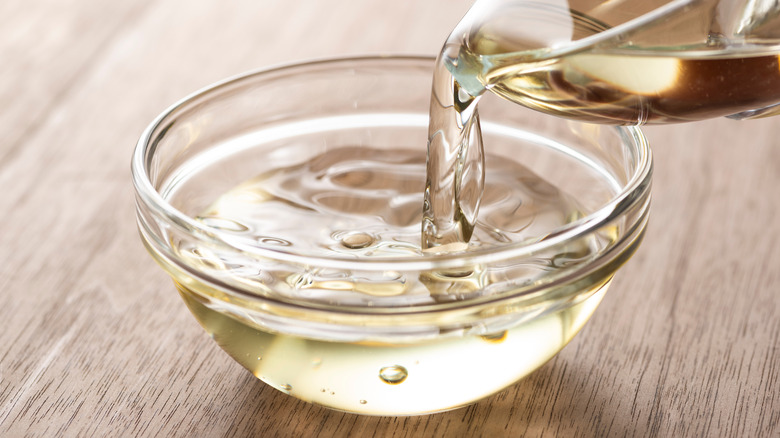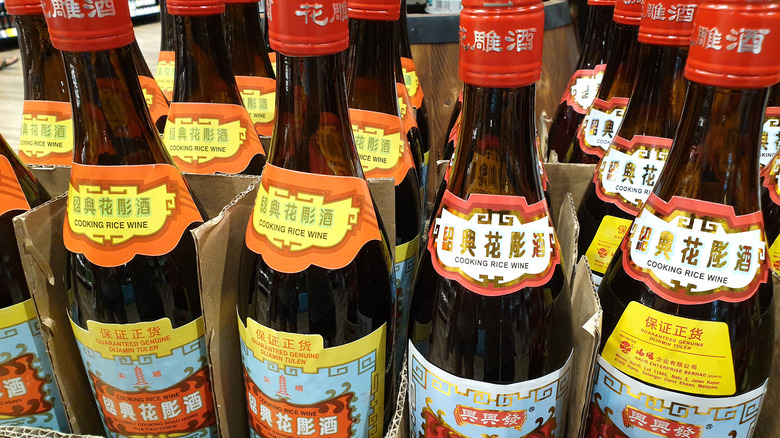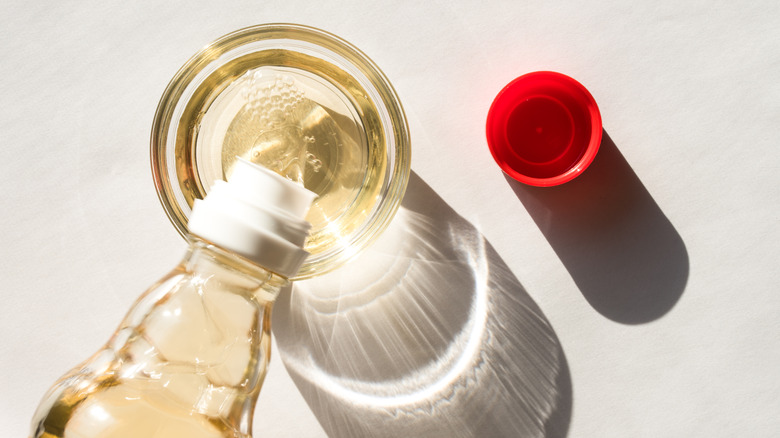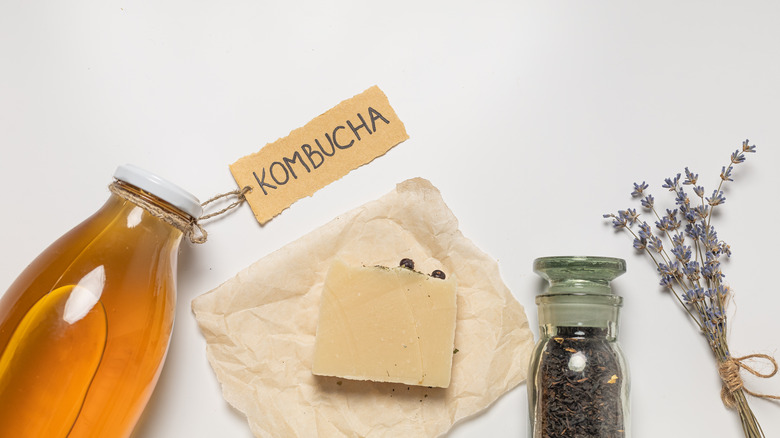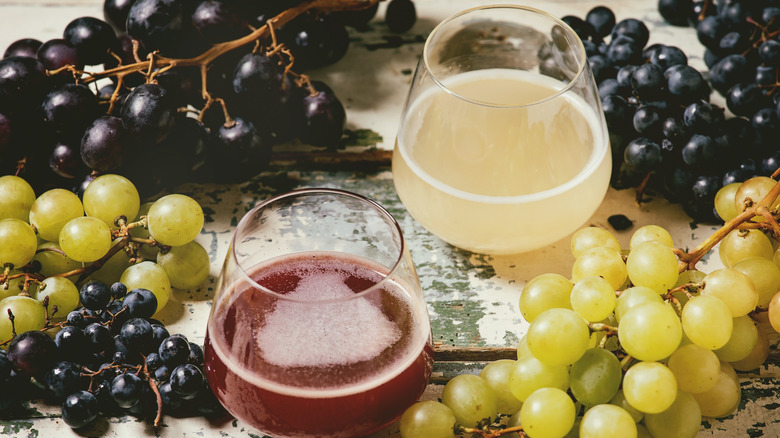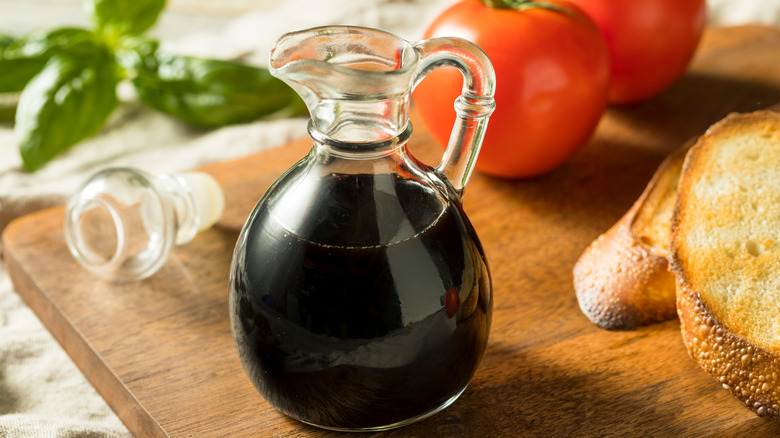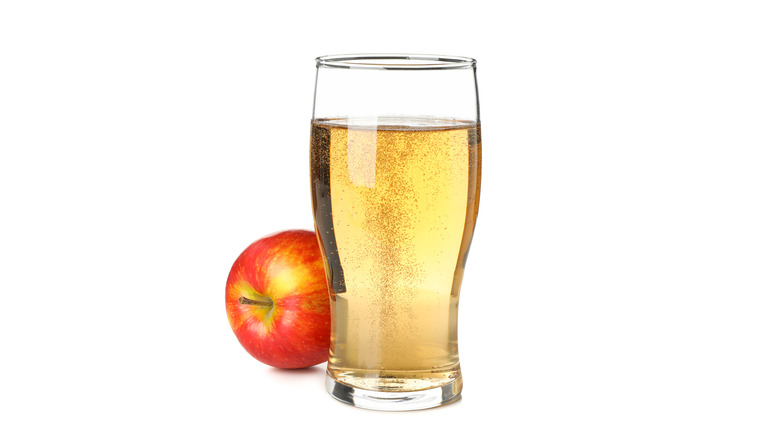10 Best Substitutes For Sake
Many people are likely familiar with sake – the traditional Japanese alcoholic beverage made from fermented rice. Sake is a staple in Japanese cuisine and is likewise enjoyed around the world. Not only is it a popular drink to sip on its own or while enjoying a meal, it's also often used in cooking and has numerous uses and benefits given its slightly sweet, fruity, and nutty flavor. According to Just One Cookbook, sake adds a sweet and yet umami flavor and enhances the overall aroma of many dishes (also helping to remove strong odors when cooking with meat and fish), and it can be a way to tenderize meat when used as part of a marinade.
As such, sake comes in drinking and cooking varieties. Cooking sake tends to contain a little less alcohol, at around 13% compared to the 20% in its drinking counterpart. More importantly, cooking sake has salt added to it, which can affect the flavor of a dish. It's recommended to add sake earlier on in the cooking process to let the flavors properly absorb, and to cook off the alcohol, says On The Gas.
But, when you run out of sake and need it in a pinch, here are 10 substitutes that work just as well in cooking applications.
1. Mirin
In some ways, mirin is the closest substitute for sake. Both are fermented from rice, and are thus equally known as rice wines. However, mirin contains more sugar and less alcohol (around 14% versus up to 20% for sake), while it also imparts a subtle tang, sweetness, richness, and a "hard-to place" umami flavor, according to Bon Appétit. As well, The Spruce Eats recommends using mirin in broths, glazes, and marinades, noting that it works particularly well when used in combination with saltier sauces such as soy sauce or tamari. The site goes on to explain that mirin has a slightly stronger taste, and a thicker consistency that is closer to that of a sauce.
If you can't find mirin, Bon Appétit recommends using aji-mirin (which basically translates to "like mirin"), such as Kikkoman's product that might be easier to find. Aji-mirin tends to contain more sugar and less than 1% alcohol, so adjustments might be necessary.
You can replace sake with mirin or aji-mirin in equal proportions. However, since mirin and aji-mirin are sweeter, you may want to cut out sugar elsewhere in the recipe if possible. And, like sake, it's is also typically added earlier in the cooking process to allow the alcohol to cook off, according to Allrecipes.
2. Chinese Shaoxing Wine
Another good substitute for sake is Chinese Shaoxing wine. Also simply known as Chinese cooking wine, it's a major staple in that country's cooking, and can be easily found in Asian grocery stores. Similar to sake, it's made from fermented rice, plus water and a little bit of wheat. Substitute Cooking explains that it has a brown color, and a slightly sweet, spicy, and nutty flavor that works well in marinades for meats, in soups and stocks, and as part of the filling for wontons and dumplings. Similar to sake, it's great for getting rid of overpowering fish and meat smells in dishes.
You can replace sake with Chinese Shaoxing wine in equal proportions, particularly for marinades and sauces. According to Cooking Light, the replacement works best when the recipe calls for a small amount of sake, such as 1 to 2 tablespoons. Chinese Shaoxing wine also often has added salt and spice, which is intentional, as a way to get around taxes for drinking wines (via Food52). So you may want to taste it first and adjust the salt and spice content elsewhere in the recipe.
3. Dry Sherry
A fortified wine, such as sherry, also makes a good substitute for sake, particularly a dry sherry. This type of wine comes from Andalusia, Spain and is made with white wine grapes, and is then fortified with a distilled spirit before being casked and undergoing a solera system. This is where younger sherries are mixed with older sherries, according to Delish, in order to age the wine. Sherry can be dry to sweet or light to intense, with a flavor profile that has hints of nuts, dried fruit, and saline, explains The Spruce Eats.
You can replace sake with dry sherry in equal proportions, particularly for sauces, stews, stir fries, meats, and pies, says Substitute Cooking. Dry sherry does have a slightly sweeter taste than sake, though the difference is quite subtle. However, Substitute Cooking warns that if you use sherry cooking wine instead of regular (drinking) sherry as a replacement, be aware that it contains added salt, which can overpower a sweet dish — though it should be fine for savory dishes.
4. Vermouth
Dry vermouth also makes for a good sake substitute. Similar to sherry, vermouth is a fortified wine made from grapes that is aromatized with botanicals. There are two main varieties: a sweet vermouth made using red grapes, which is sweeter than a dry vermouth made from white grapes.
Dry vermouth can add an interesting depth of flavor or it can completely throw off the flavor profile of the dish, which is why Fine Dining Lovers suggests experimenting on a small batch of food first. A Couple Cooks also warns against using sweet or semi-sweet vermouth, as it would change the character of the recipe by making it too sweet.
According to Substitute Cooking, vermouth works best as a replacement in sauces, soups, as a marinade for fish or meat, and in some sweet dishes. You can also add a bit of sugar when using vermouth as a replacement for sake to enhance the flavor — about two tablespoons for every half cup of vermouth used will help balance the recipe.
5. Dry White Wine
If you don't have any sake for a recipe, you can also reach for a regular white wine instead, which you may be more likely to have on hand or have easy access to retrieve. A dry white wine is preferred as its flavor profile is most similar to that of sake, rather than a sweet white wine, says A Couple Cooks. They also point out that sake is a bit stronger than most white wines. Fine Dining Lovers recommends using stronger and fuller-bodied varietals for this application, such as a Chardonnay, Semillon, or White Rioja with more than 13% alcohol.
Substitute Cooking further recommends using white wine in pasta as well as dishes with mushrooms, seafood, fish, vegetables, and chicken. They also suggest adding the white wine earlier in the cooking process, so that it can simmer with all the other ingredients for the best flavor. Replace white wine for sake in a 1:1 ratio. Here too, you can add a bit of sugar to better balance the flavors of the recipe, ideally two teaspoons of sugar for every one teaspoon of white wine used.
6. Rice Wine Vinegar
Rice wine vinegar is made by extracting sugar from rice and fermenting it into an alcohol and then an acid, which gives it a mildly sweet flavor. It's a staple in many Asian cuisines. According to Substitute Cooking, it makes an especially good replacement for sake when used to make dressings, marinades, or sauces. It's also a good option for those who do not want to add any alcohol to their dishes.
However, rice wine vinegar has a strong, more concentrated flavor, which is comparable to sake, according to Fine Dining Lovers, as white balsamic is to white wine. That is, the intensity of the core flavors needs to be diluted to achieve the best results. To do so, A Couple Cooks recommends adding 3 tablespoons of water to 1 tablespoon of rice wine vinegar in order to have the best swap to replace a 1/4-cup of sake. According to Cooking Light, you can also use rice wine vinegar mixed with white grape juice instead of water. Recipe Marker also recommends adding a bit of sugar when using rice wine vinegar to help balance out the flavors.
7. Kombucha
Kombucha is a fermented and fizzy beverage made from black tea, sugar, and yeast. It originated in Asia thousands of years ago but has gained immense popularity in recent years. Kombucha can also be used as a substitute for sake when cooking, and brings with it a similar level of acidity as sake does to the final dish. Although kombucha usually has a small percentage of alcohol, it's much less than that of sake.
Fine Dining Lovers also recommends using homemade kombucha rather than commercially available brands as the latter is usually sweetened, which can throw off the flavor of the dish. Moreover, store-bought brands often contain added flavors that wouldn't necessarily work in a recipe. Kombuchas with fruity flavors in particular would not work well in Japanese dishes with delicate flavors. According to The Eat Down, you can use the same amount of kombucha as you would sake in a recipe.
8. White Grape Juice
White grape juice is a good option for those looking for a non-alcoholic substitute for sake to use in cooking. Made from grapes with green skin, white grape juice has a sweet yet refreshing taste, with some herbal tones. It also comes with numerous health benefits, such as containing antioxidants and providing a high level of vitamin C, which may help to boost immunity (via I Really Like Food).
According to The Eat Down, white grape juice is also a good option to use to dilute other, stronger sake replacements, such as rice wine vinegar. The outlet recommends adding a little bit of lemon juice to the white grape juice to give it a bit of a kick. I Really Like Food also recommends using a bit of lemon zest with the white grape juice to help with tenderizing. You can use white grape juice in equal proportions when utilizing as a replacement for sake in cooking.
9. Balsamic Vinegar
If you have balsamic vinegar in your pantry, then you can also use that as a sake substitute. Made from a white Trebbiano grape juice that is barrel-aged for a number of years (ranging anywhere from 3-25 years), balsamic vinegar has a distinctive brown color and syrupy body, plus a sweet and mildly acidic flavor, which adds a bit of sweetness and umami flavor when added to dishes (via Substitute Cooking). If those are the flavors you are hoping to achieve with sake, then using balsamic vinegar will work particularly well as a replacement.
According to Substitute Cooking, balsamic vinegar pairs well with stews, risotto, seafood, and grilled meat dishes. It works particularly well as a sake substitute when used for making salad dressings, sauces, marinades, or for roasting vegetables — even for making desserts. The site also recommends adding the balsamic vinegar at the very end of the cooking process for the best results and overall taste.
10. Apple Cider
In a pinch, you can also use apple cider to swap in for sake when cooking. Apple cider, which is similar to apple juice (and depending on the situation, practically the same thing), should not be confused with apple cider vinegar, the latter of which is apple cider that has been further fermented into a vinegar. Depending on the type of apple used, apple cider has a sour and mildly sweet flavor and can help add acidity to a dish when used for cooking purposes. Recipe Marker warns that apple cider does not make the best sake substitute, though it can impart a nice flavor to a dish.
According to Substitute Cooking, apple cider works best when used in soups, salads, sauces, syrups, marinades, dressings, and sweets like candies and cakes. The website further suggests adding some water to dilute the flavor in cases when it might be too strong in a dish — or adding a bit of sugar if you need a sweeter taste than the apple cider naturally provides.
